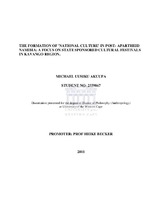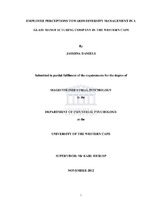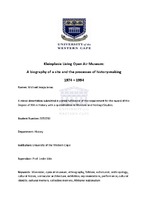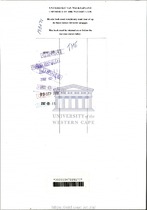The formation of 'national culture' in post- apartheid Namibia: a focus on state sponsored cultural festivals in Kavango region
Abstract
This dissertation investigates colonial and postcolonial practices of cultural representations in Namibia. The state sponsored Annual National Culture Festival in Namibia was studied with a specific focus on the Kavango Region in northeastern Namibia. I was particularly interested in how cultural representations are produced by the nation-state and local people in a post-colonial African context of nation-building and national reconciliation, by bringing visions of cosmopolitanism and modernity into critical dialogue with its colonial past. During the apartheid era, the South African administration encouraged the inhabitants of its Native Homelands to engage in cultural activities aimed at preserving their traditional cultures and fostering a sense of distinct cultural identity among each of Namibia officially recognized ;ethnic groups. This policy was in line with the logic of South African colonial apartheid rule of Namibia, which relied upon the emphasis of ethnic differences, in order to support the idea that the territory was inhabited by a collection of requiring a central white government to oversee their development. The colonial administration resorted to concepts of traditional and cultural heritage in order to construct Africans as members of distinct, bounded communities attached to specific localities or homelands. My central argument is that since Namibian independence in 1990, the postcolonial nation-state has placed emphasis on cultural pride in new ways, and identifying characteristics of Namibian-nessa. This has led to the institution of cultural festivals, which have since 1995 held all over the country with an expressed emphasis on the notion of Unity in Diversity. These cultural festivals are largely performances and cultural competitions that range from lang-arm dance, and traditional dances, displays of traditional foodstuffs and dramatized representations. The ethnographic study shows that while the performers represent diversity through dance and other forms of cultural exhibition, the importance of belonging to the nation and a larger constituency is simultaneously highlighted. However, as the study demonstrates, the festivals are also spaces where local populations engage in negotiations with the nation-state and contest regional forms of belonging. The study shows how a practice which was considered to be a colonial representation of the other has been reinvented with new meanings in postcolonial Namibia. The study demonstrates through an analysis of cultural representations such as song, dances and drama that the festival creates a space in which social interaction takes place between participants, spectators and officials who organize the event as social capital of associational life.
Related items
Showing items related by title, author, creator and subject.
-
Employee perceptions towards diversity management in a glass manufacturing company in the Western Cape
Daniels, Jasmina (2012)Diversity is an inevitable aspect of organisational life, which has to be dealt with at one time or another. How employees perceive diversity impacts on their behaviour and therefore managing it is imperative. The purpose ... -
Kleinplasie living open air museum: a biography of a site and the processes of history-making 1974 – 1994
Jonas, Michael Jesaja (University of the Western Cape, 2012)In 1974 an Agricultural Museum Committee was established at the Worcester Museum which ultimately led to the development in 1981 of the Kleinplasie Open Air Farm Museum.This began a new phase in the museum’s history, one ... -
Signification of African cultural identity, individual African identity and performance in Mathematics among some standard nine African pupils in Mangaung high schools
Mahlomaholo, Geoffrey Mahlomaholo (University of the Western Cape, 1998)This study investigates how two groups of African pupils, namely the low and high performers in standard 9 mathematics classes in some high schools in Mangaung, construct meaning of their African cultural, individual African ...




